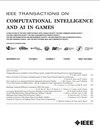Statistical Relational Learning for Game Theory
Q2 Computer Science
IEEE Transactions on Computational Intelligence and AI in Games
Pub Date : 2016-12-01
DOI:10.1109/TCIAIG.2015.2490279
引用次数: 3
Abstract
In this paper, we motivate the use of models and algorithms from the area of Statistical Relational Learning (SRL) as a framework for the description and the analysis of games. SRL combines the powerful formalism of first-order logic with the capability of probabilistic graphical models in handling uncertainty in data and representing dependencies between random variables: for this reason, SRL models can be effectively used to represent several categories of games, including games with partial information, graphical games and stochastic games. Inference algorithms can be used to approach the opponent modeling problem, as well as to find Nash equilibria or Pareto optimal solutions. Structure learning algorithms can be applied, in order to automatically extract probabilistic logic clauses describing the strategies of an opponent with a high-level, human-interpretable formalism. Experiments conducted using Markov logic networks, one of the most used SRL frameworks, show the potential of the approach.博弈论的统计关系学习
在本文中,我们鼓励使用统计关系学习(SRL)领域的模型和算法作为描述和分析游戏的框架。SRL将一阶逻辑的强大形式化与概率图形模型在处理数据中的不确定性和表示随机变量之间的依赖关系方面的能力相结合:因此,SRL模型可以有效地用于表示几种类型的游戏,包括具有部分信息的游戏,图形游戏和随机游戏。推理算法可用于解决对手建模问题,以及找到纳什均衡或帕累托最优解。可以应用结构学习算法,以自动提取描述对手策略的概率逻辑子句,具有高级的,人类可解释的形式主义。使用马尔可夫逻辑网络(最常用的SRL框架之一)进行的实验显示了该方法的潜力。
本文章由计算机程序翻译,如有差异,请以英文原文为准。
求助全文
约1分钟内获得全文
求助全文
来源期刊

IEEE Transactions on Computational Intelligence and AI in Games
COMPUTER SCIENCE, ARTIFICIAL INTELLIGENCE-COMPUTER SCIENCE, SOFTWARE ENGINEERING
CiteScore
4.60
自引率
0.00%
发文量
0
审稿时长
>12 weeks
期刊介绍:
Cessation. The IEEE Transactions on Computational Intelligence and AI in Games (T-CIAIG) publishes archival journal quality original papers in computational intelligence and related areas in artificial intelligence applied to games, including but not limited to videogames, mathematical games, human–computer interactions in games, and games involving physical objects. Emphasis is placed on the use of these methods to improve performance in and understanding of the dynamics of games, as well as gaining insight into the properties of the methods as applied to games. It also includes using games as a platform for building intelligent embedded agents for the real world. Papers connecting games to all areas of computational intelligence and traditional AI are considered.
 求助内容:
求助内容: 应助结果提醒方式:
应助结果提醒方式:


